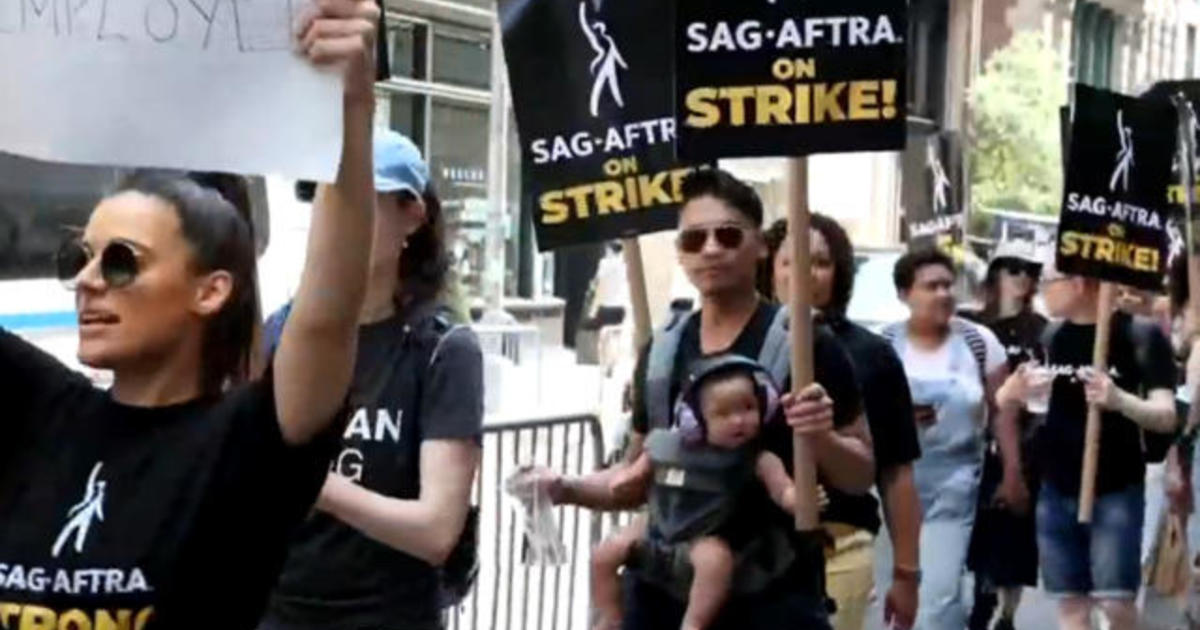Hollywood Strike: Actors Join Writers, Bringing Production To A Standstill

Table of Contents
The Writers' Strike: A Precursor to the Actors' Walkout
The Hollywood strike began with the WGA's walkout in May, marking the first major writers' strike in 15 years. Their core demands centered on addressing the changing landscape of the entertainment industry, particularly the shift to streaming platforms. The prolonged writers' strike, already significantly impacting production schedules, highlighted the deep-seated concerns within the creative community. Key demands included:
- Minimum staffing levels on productions: Ensuring adequate writers' rooms and preventing overwork.
- Fair compensation for streaming residuals: Addressing the disparity between traditional television and streaming revenue models. Writers argue that the current system unfairly undervalues their work on streaming platforms.
- Concerns about the use of AI in writing: The WGA is pushing for protections against the use of AI to replace human writers, emphasizing the importance of preserving human creativity and authorship.
SAG-AFTRA Joins the Fight: Actors Walk Out in Solidarity
Following the WGA's strike, SAG-AFTRA, representing over 160,000 actors, joined the picket lines, solidifying the unprecedented nature of this Hollywood strike. Their decision was driven by similar concerns about fair compensation in the streaming era, along with unique challenges specific to actors. Key demands of SAG-AFTRA include:
- Fair wages and residuals in the streaming era: Echoing the WGA's concerns about the inadequacy of current compensation models for streaming content. Actors argue that their work on streaming shows generates significant revenue for studios, yet they receive minimal residuals.
- Protecting actors from the use of AI in performance: Concerns include the potential for studios to use AI to replicate actors' performances, diminishing their value and control over their work.
- Concerns about self-taping and its impact on working conditions: The rise of self-taping has shifted costs and responsibilities onto actors, impacting their working conditions and compensation.
The Impact of the Hollywood Strike: A Widespread Industry Shutdown
The combined Hollywood strike has brought the entertainment industry to a near standstill. The consequences are far-reaching and impact numerous sectors:
- Delayed film and television releases: Numerous projects are on hold, pushing back release dates and impacting studio schedules.
- Job losses for crew members and support staff: The strike has led to widespread job losses for individuals working behind the scenes, from grips and gaffers to caterers and drivers.
- Potential impact on upcoming award seasons: The strike threatens to significantly alter the upcoming award season, potentially impacting nominations and ceremonies.
- Economic ripple effects felt in related businesses: Businesses reliant on the entertainment industry, including restaurants, hotels, and transportation services, are also experiencing economic repercussions.
Potential Resolutions and the Road Ahead for the Hollywood Strike
Resolving this Hollywood strike requires significant compromises from both the unions and the studios. Key negotiation points include:
- Potential compromises on streaming residuals: Finding a fair and sustainable model for compensating writers and actors for their work on streaming platforms is crucial.
- Negotiations around AI usage in creative processes: Establishing clear guidelines and regulations for the use of AI in writing and acting is a critical aspect of the negotiations.
- The likelihood of a prolonged strike and its long-term implications: The longer the strike continues, the more severe the economic and creative consequences will be for the entire industry.
Conclusion: The Future of the Hollywood Strike and its Lasting Effects
This Hollywood strike, driven by crucial concerns regarding fair compensation, the impact of streaming, and the ethical implications of AI, is reshaping the entertainment landscape. The demands of both the WGA and SAG-AFTRA highlight the need for a more equitable and sustainable system within the industry. The duration and resolution of this strike remain uncertain, with significant implications for the future of filmmaking and television. Stay updated on the latest developments in the Hollywood strike by following [link to relevant news source] and [link to union website].

Featured Posts
-
 Le Dechiffrage L Euro Resiste Aux Tensions
May 11, 2025
Le Dechiffrage L Euro Resiste Aux Tensions
May 11, 2025 -
 Revealed Prince Andrews Uncontrolled Temper And Palace Staff Accounts
May 11, 2025
Revealed Prince Andrews Uncontrolled Temper And Palace Staff Accounts
May 11, 2025 -
 Is Jessica Simpson Returning To Reality Tv New Album Hints At Comeback
May 11, 2025
Is Jessica Simpson Returning To Reality Tv New Album Hints At Comeback
May 11, 2025 -
 Aaron Judges 1 000 Games A Hall Of Fame Trajectory
May 11, 2025
Aaron Judges 1 000 Games A Hall Of Fame Trajectory
May 11, 2025 -
 Ufc 315 Early Predictions Potential Fight Outcomes And Betting Odds
May 11, 2025
Ufc 315 Early Predictions Potential Fight Outcomes And Betting Odds
May 11, 2025
